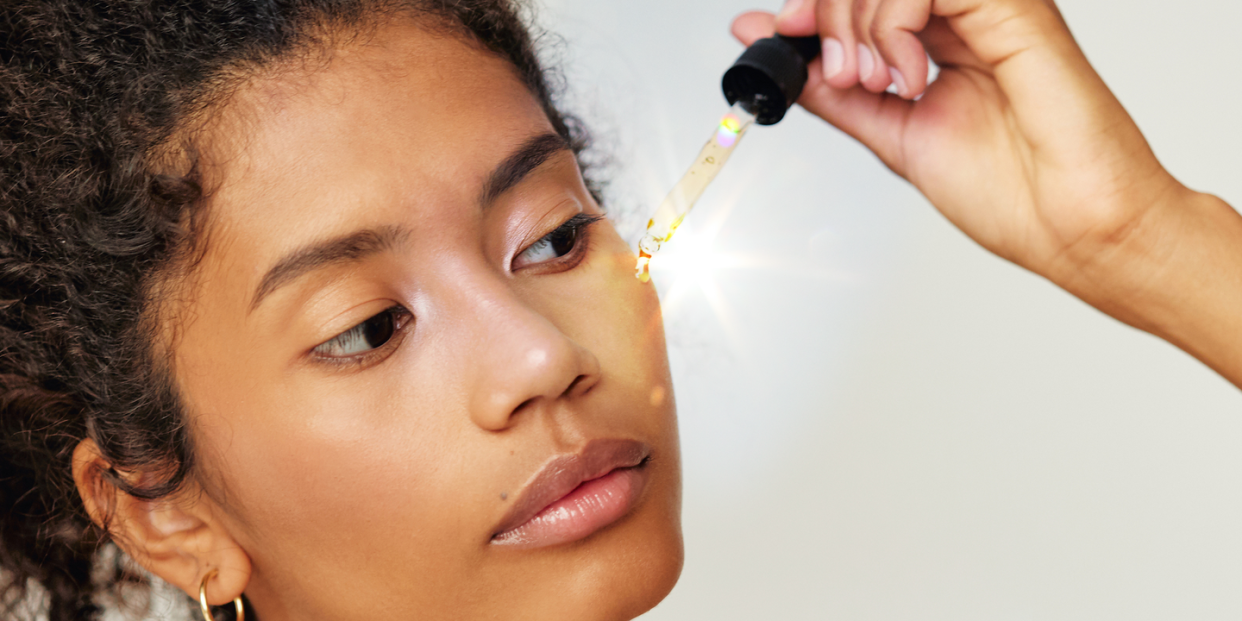So, People Are Putting Essential Oils In Their Face Masks—But Is It Safe?

As we are now on day INFINITY of our apocalyptic, mask-wearing lives, it’s unsurprising that civilization has tried to make cloth face masks as cute, comfortable, and sanity-preserving as possible. I mean, we're midway through 2020, and you’ve already got your ~*fashun*~ masks, your mani-matching masks, and now, apparently, your aromatherapy masks (?!).
Yup, according to both my IG feed and my friends who love to frantically text me late at night for skin advice (hey, Liz), the hawt new thang to do with masks is to spray or dab them with essential oils to create a nicer breathing experience for your nose instead of the usual aroma of sour coffee breath. Mmm.

But as someone who has supremely sensitive skin and is terrified of all essential oils and fragrances, my immediate reaction to this trend was to yell “NOPE” into the void/my DMs—and then, of course, go to the real doctors/experts for their thoughts.
According to dermatologist Mona Gohara, MD, associate clinical professor at Yale School of Medicine, my gut reaction wasn’t totally off the mark: “Essential oils are known skin irritants and allergens,” she says. “They’re the closest form to the pure plant itself, so there’s nothing in them that’s acting as a buffer—they’re highly concentrated and can be highly irritating if they come in direct contact with your skin.” The potential result? Itching, redness, rashes, bumps, and burns.
But, wait, what about in a diluted form? What if you dilute the EO (essential oil) with water or a carrier oil (i.e., a fatty oil that acts as a diluting buffer) and then dab it on the inside of your mask (which, FWIW, is how most essential oil lovers roll)? “That’s like saying putting poison ivy in water dilutes the poison—it doesn’t work that way,” says Dr. Gohara. “Essential oils can still be irritating in their diluted form, especially if you have sensitive skin, rosacea, eczema, or are someone who can’t tolerate costume jewelry.” Wait, wha? Yup: “People who react to fake gold or get irritated by fake jewelry tend to also have high reactivity to essential oils, she says.

Still, even if you’re totally chill with fragrances, fake earrings, poison ivy, and have a face made of pure marble, there’s another safety issue to consider. Because depending on the face mask you’re using and the area you’re applying your EOs, essential oils can mess with the material’s filtering capabilities, rendering the fibers less effective at protecting you and others against COVID-19. That’s not to say a tiny dab of diluted essential oils on the outside hem of your mask—i.e., the thickest, non-filtering part of your mask—will destroy both your skin and your respiratory safety, because no, it likely won’t. But misting the inside and/or outside of your mask with fragrant oils? That’s another story.
“You have to weigh the potential your pros and cons if you’re concerned about your skin,” says Dr. Gohara. “I totally get the relaxation aspect if you’re looking for a therapeutic experience, but I probably wouldn’t risk it if you have skin that’s at all sensitive, acne-prone, or irritable.” Because, fun fact, even having essential oils in the air around your skin can be sensitizing to anyone who has an allergy to them (hi, me!). Basically, your skin could have zero contact with EOs and still get irritated and itchy.

That being said, you’re probably here because you’re already interested in trying the EO/mask combo, and if you’re going to drink apply essential oils to your face mask, I’d rather you do it in the house. So, the instructions you’re looking for—just with, like, a ton of asterisks and prefaces, first.
1. In tiny bowl or mug, mix 1-2 drops of your favorite essential oil with a teaspoon of carrier oil (coconut oil or olive oil work well).
2. With a Q-tip, dab a thin layer of the diluted oil to the outside seam of your mask only (like a few small dots on the bridge of the nose seam, if you’re positive it won’t seep through the mask and onto your skin)
3. If your mask does leave your skin feeling itchy or irritated, deep-clean it by washing it with a fragrance-free laundry detergent and, like, not trying this trend again.
You Might Also Like
